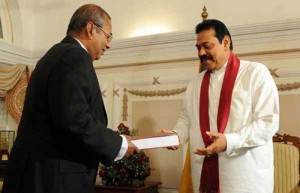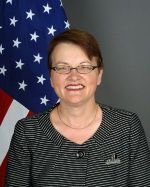LLRC report:The Need for Transparency
“Our challenge is strongly to encourage the Sri Lankan government to embrace reconciliation,
accountability, and respect for human rights, while trying not to push the country towards Burma-like isolation from the west” Patricia A. Butenis Former US Ambassador in Sri Lanka as revealed in Wikileaks cables.
The Lessons Learnt and Reconciliation Commission (LLRC) presented its final report to the President last week. The LLRC was appointed by the President under the Commissions of Inquiry Act No.17 of 1948 as amended to examine the events from the commencement of the operation of the ceasefire agreement on 21st February 2002 to the termination of the conflict on 19th May 2009.
Subsequent to the visit of the Secretary General of the United Nations to Sri Lanka on 23rd May 2009, at which time the Sri Lanka government made a commitment to take measures to address accountability issues resulting from the armed conflict and in order to address the mounting international pressure for such accountability, the LLRC was appointed.
The Chairman of the eight member Commission, former Attorney-General C.R.De Silva stated that:”The Commission is to focus on the causes of conflict, its effects on the people and promote national unity and reconciliation, so that all citizens of Sri Lanka irrespective of ethnicity and religion, could live in dignity and a sense of freedom.”It bas further stated that:’ It is also expected to identify mechanisms for restitution to the individuals, whose lives have been significantly impacted by the conflict.”As a large number of individuals and organizations wished to give evidence before the Commission, which commenced hearings in August 2010 and the final report was expected to be handed over in November 2010, its mandate was further extended by the President.
In the report by the Panel of Experts appointed by the United Nations General Secretary it is alluded that: “Paragraph 296. Indeed, there is a troublingly consistent experience with previous commissions of

Former Attorney General and Commission Chairman CR De Silva hands over the LLRC report to President Rajapakse on November 20, 2011 at his residence at Temple Trees in Colombo, Sri Lanka
inquiry created in response to calls for accountability for serious and systematic abuses of human rights. Spanning three decades and beginning with the 1977 Sansoni Commission, these commissions have almost invariably been beset by a combination of flaws that have profoundly hampered their work.”Indeed it has been observed that starting with the 1977 Sansoni Commission to the 2007’s Udalagama Commission such commissions failed to produce recommendations supported by substantial and unbiased documents and in the few occasions in which they came up with acceptable and fair recommendations, they have not been implemented by the governments that appointed them. This has been attributed to the lack of political will of the successive governments in power to implement the recommendations of such commissions, which were restricted to the papers they were written on.
Among the criticisms faced by the Commission, there are serious concerns about the composition of the commission, conflict of interest regarding some of its members who are closely affiliated to the government, and the absence of a witness protection program which is essential for the witnesses to give evidence without fear of reprisals.
It must be noted that despite all criticisms, the commission documented a large number of grievances from thousands of persons affected by the war and facing diverse problems as a result In addition to sitting in Colombo it held hearings in Vauniya, (including Menik Farm), Kilinochchi, Mullaitivu, Omanthai, (including the detention facility), Batticloa, Trincomalee and Jaffna. The UN Expert Panel Report, while being critical of the composition and failure to meet international standards for an effective accountability mechanism, inadequacy of transparency, witness protection mechanisms etc. states: ‘343.The LLRC offers a potentially useful opportunity for the beginning of a national dialogue regarding the final stages of the war, as well as other issues related to the conflict.’ It is this undue emphasis on the final stages of the war ignoring the fact that the conflict had existed during a span of three decades with many atrocities being committed during that period that casts a doubt on the impartiality of the UN Expert Panel Report. While emphasizing the events that are alleged to have occurred during the final stages of the war it ignores to focus on the terrible atrocities committed by the barbaric LTTE under the leadership of ruthless Prabhakaran, who commanded what was known as the most dangerous terrorist organization in the world.
The LLRC has been greeted as a step in the right direction and acclaimed as a great achievement by the supporters of the Sri Lankan regime while international human rights groups including Amnesty International and Human Rights Watch dismissed the commission and refused even to appear before it. The writer is in total agreement with the recommendations found in the UN Expert Panel Report that the final report of the LLRC must be made public.
The Panel Report states;”Paragraph 312 Best International practice holds that the work of a commission, such as the LLRC should culminate in the production of a report containing both its findings and its recommendations…Beat practice also holds that these should be made public subject only to withholding or reduction of identifying particular individuals, whose life or physical security may be at risk as a result of disclosure…it is most important that it should be shared with the people of Sri Lanka. Best practice would require that LLRC give wide public distribution of all its findings and recommendations.’ As Lord Hutton said, “it is of fundamental importance that justice should not only be done, but should manifestly and undoubtedly be seen to be done.”
The Sri Lankan people eagerly await to be made aware of the nature of the findings and the recommendations of the Commission, which they expect to be useful in arriving at the formulation of a proper reconciliation process from the lessons learnt from the past experiences in resolving the disputes and conflicts faced by our people. The Sri Lankan regime should display the political will to implement the recommendations depending on the validity and usefulness of such recommendations, which have been made by a panel of experts headed by a former Attorney-General of Sri Lanka.
The writer is an Attorney-at-Law

